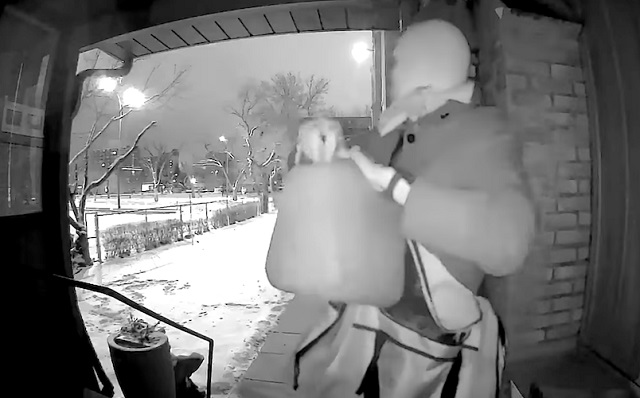Crime
Priority Crimes Task Force Charges Four After Counterfeit Credit Card Search Warrant

A man and a woman face a total of 84 criminal charges related to stolen and counterfeit credit cards after a Priority Crimes Task Force investigation that began in early March and culminated in a search warrant at a Sylvan Lake residence where RCMP seized credit card counterfeiting items and stolen credit cards. The investigation and search warrant were executed collaboratively by Red Deer and Sylvan Lake RCMP.Shortly before 9:30 am on March 16, RCMP executed the search warrant at a residence on Sylvan Drive and took four people into custody without incident. During the search, RCMP seized a number of stolen credit cards, cheques, identity documents, what is believed to be methamphetamine, and a shotgun. With regard to the counterfeit investigation, RCMP seized numerous electronics and items consistent with counterfeit and forgery activities, including a credit card embossing machine and a card printer.RCMP then spent many more hours investigating the origin of the items seized to determine which were stolen and which may be forgeries in order to lay the appropriate charges. A number of the credit cards and identity documents had been stolen after they were left in vehicles that were subsequently broken into, in central Alberta and beyond.42 year old James Johnstone Jardine was wanted on six outstanding warrants for fraud under $5,000 at the time of his arrest and now faces 43 further charges:· Criminal Code 342.01 – Possession of instrument used for forging credit cards X 3· Criminal Code 342(1)(b) – Forgery of credit card· Criminal Code 366(1)(a) – Forgery X 7· Criminal Code 91(1) – Unauthorized possession of a firearm· Criminal Code 86(1) – Careless use of a firearm· Criminal Code 355(b) – Possession of stolen property under $5,000 X 28· Criminal Code 733.1(1) – Fail to comply with probation X 2Jardine is scheduled to appear in court in Red Deer on September 18 at 9:30 am.46 year old Rachel Jean Meyerink was wanted on an outstanding warrant at the time of her arrest and faces the following 41 additional charges:· Criminal Code 342.01 – Possession of instrument used for forging credit cards X 3· Criminal Code 342(1)(b) – Forgery of credit card· Criminal Code 366(1)(a) – Forgery X 7· Criminal Code 91(1) – Unauthorized possession of a firearm· Criminal Code 86(1) – Careless use of a firearm· Criminal Code 355(b) – Possession of stolen property under $5,000 X 28Meyerink is scheduled to appear in court in Red Deer on September 18 at 9:30 am.44 year old Chance Tosh Murananka faces the following charges:· CDSA 4(1) – Possession of Schedule I substance (methamphetamine)· Criminal Code 145(3) – Fail to comply with conditionsChance Muranka is scheduled to appear in court in Red Deer on August 1 at 9:30 am.41 year old Travis Jeremy Murananka has already appeared in court and been sentenced on the following charges:· Criminal Code 355(b) – Possession of stolen property under $5,000· Criminal Code 145(3) – Fail to comply with conditions
Addictions
British Columbia should allow addicts to possess even more drugs, federal report suggests

From LifeSiteNews
Despite the drug crisis only getting worse in British Columbia after decriminalization, a federal report by the Canadian Institutes of Health Research advocates for further relaxing its policy so addicts can possess even more drugs.
Despite the drug crisis only worsening since decriminalization, federal researchers are now advocating for British Columbia to allow the possession of even larger quantities of cocaine, claiming that current possession limits don’t allow addicts to buy enough.
According to a federal report published April 23 by Blacklock’s Reporter, the current decriminalization program in British Columbia approved by Prime Minister Justin Trudeau’s government has set cocaine possession limits “too low.”
“People who use drugs are less concerned about being arrested and feel more comfortable carrying substances they need,” said the report by the Canadian Institutes of Health Research. “The threshold of 2.5 grams is too low and is unreflective of users’ substance use and purchasing patterns.”
Under the policy, which launched in early 2023, the federal government began allowing people within the province to possess up to 2.5 grams of hard drugs – including cocaine, opioids, ecstasy and methamphetamine – without criminal penalty, but selling drugs remained a crime.
The policy has been widely criticized, especially after it was found that the province broke three different drug-related overdose records in the first month the new law was in effect.
However, now researchers are claiming that the new policy is insufficient for drug users.
“People who use drugs indicated the 2.5 gram threshold is too low and unreflective of their substance use patterns,” the report stated. “Although some people indicated the policy wouldn’t impact their purchasing patterns because they are unable to purchase large amounts at a time, others suggested it may force them to seek out substances more frequently which could increase their risk of harms.”
“Buying in bulk may be more economical particularly for people who use drugs,” it continued, adding that it was “common practice to purchase in bulk and split or share among peers.”
The recommendation comes as deaths from drug overdoses in Canada have gone through the roof in recent years, particularly in British Columbia.
The effects of decriminalizing hard drugs in various parts of Canada has been exposed in Aaron Gunn’s recent documentary, Canada is Dying, and in U.K. Telegraph journalist Steven Edginton’s mini-documentary, Canada’s Woke Nightmare: A Warning to the West.
Gunn says he documents the “general societal chaos and explosion of drug use in every major Canadian city.”
“Overdose deaths are up 1,000 percent in the last 10 years,” he said in his film, adding that “[e]very day in Vancouver four people are randomly attacked.”
Similarly, even Liberals have begun to condemn Trudeau’s “safe supply” program, linking them to “chaos” in cities.
“Safe supply“ is the term used to refer to government-prescribed drugs that are given to addicts under the assumption that a more controlled batch of narcotics reduces the risk of overdose – critics of the policy argue that giving addicts drugs only enables their behavior, puts the public at risk, disincentivizes recovery from addiction and has not reduced, and sometimes even increased, overdose deaths where implemented.
Last week, Liberal MP Dr. Marcus Powlowski revealed that violence from drug users has become a problem in Ottawa, especially in areas near so-called “safe supply” drug sites which operate within blocks of Parliament Hill.
“A few months ago I was downtown in a bar here in Ottawa, not that I do that very often, but a couple of colleagues I met up with, one was assaulted as he was going to the bar, another one was threatened,” said Powlowski.
“Within a month of that I was returning down Wellington Street from downtown, the Rideau Centre, and my son who is 15 was coming after me,” he continued. “It was nighttime and there was someone out in the middle of the street, yelling and screaming, accosting cars.”
Crime
Canadian receives one-year jail sentence, lifetime firearms ban for setting church on fire

From LifeSiteNews
Jordan Willet was convicted of starting a blaze in February at Blessed Sacrament Parish in Regina, Saskatchewan.
A man who was charged with arson after trying to burn down a historic Catholic church earlier this year was handed only a one-year jail sentence for his crime but has also been banned from being able to possess firearms for life.
On April 9, a court sentenced Jordan Willet, 31, to 278 days in jail for intentionally or recklessly causing damage by fire or explosion to property and for not complying with a probation order. In February, LifeSiteNews reported that Willet had been arrested and charged with starting a fire at Blessed Sacrament Parish in Regina, Saskatchewan, on February 9.
He pleaded guilty to both charges and also received an 18-month probation sentence along with a lifetime firearm prohibition.
Over the weekend, Fr. James Hentges, the parish pastor, said he was “relieved he is in custody and is not a threat.”
The parish had posted footage of the February 9 attack on social media and put out a plea for anyone who had information on the event to report it to police.
The video footage of the attack, taken from a doorbell camera, shows Willet, in a mask, pouring fuel on the church before setting it on fire.
Fire investigators determined that the blaze was caused by a direct act of arson.
Since the spring of 2021, more than 100 churches, most of them Catholic, have been burned or vandalized across Canada. The attacks on the churches came shortly after the unconfirmed discovery of “unmarked graves” at now-closed residential schools once run by the Church in parts of the country.
In 2021 and 2022, the mainstream media ran with inflammatory and dubious claims that hundreds of children were buried and disregarded by Catholic priests and nuns who ran some of the schools.
Despite the church burnings, the federal government under Prime Minister Justin Trudeau has done nothing substantial to bring those responsible to justice or to stem the root cause of the burnings.
The claims, which were promoted by Trudeau among others, lack any physical evidence and were based solely on soil disturbances found via ground-penetrating radar.
In fact, in August 2023, one such site underwent a four-week excavation and yielded no remains.
Despite the lack of evidence, the Canadian Broadcasting Corporation (CBC) and others have continued to push the narrative, even running a report recently that appeared to justify the dozens of attacks against Catholic churches.
In January, Conservative Party leader Pierre Poilievre not only condemned the rash of church burnings in Canada but called out Trudeau for being silent on the matter.
-

 conflict2 days ago
conflict2 days agoCol. Douglas Macgregor torches Trump over support for bill funding wars in Ukraine and Israel
-

 Health2 days ago
Health2 days agoTransgender activists are threatening the author of scathing UK report on child ‘sex changes’
-

 Frontier Centre for Public Policy2 days ago
Frontier Centre for Public Policy2 days agoThe end of Canada: The shift from democracy to totalitarian behavior in the ‘pandemic era’
-

 International2 days ago
International2 days agoBiden admin expands Title IX to include ‘gender identity,’ sparking conservative backlash
-

 Alberta2 days ago
Alberta2 days agoAlberta’s baby name superstar steals the show again
-

 Business19 hours ago
Business19 hours agoUN plastics plans are unscientific and unrealistic
-

 Censorship Industrial Complex2 days ago
Censorship Industrial Complex2 days agoNow We Are Supposed to Cheer Government Surveillance?
-

 Business21 hours ago
Business21 hours agoDon’t be fooled by high-speed rail





